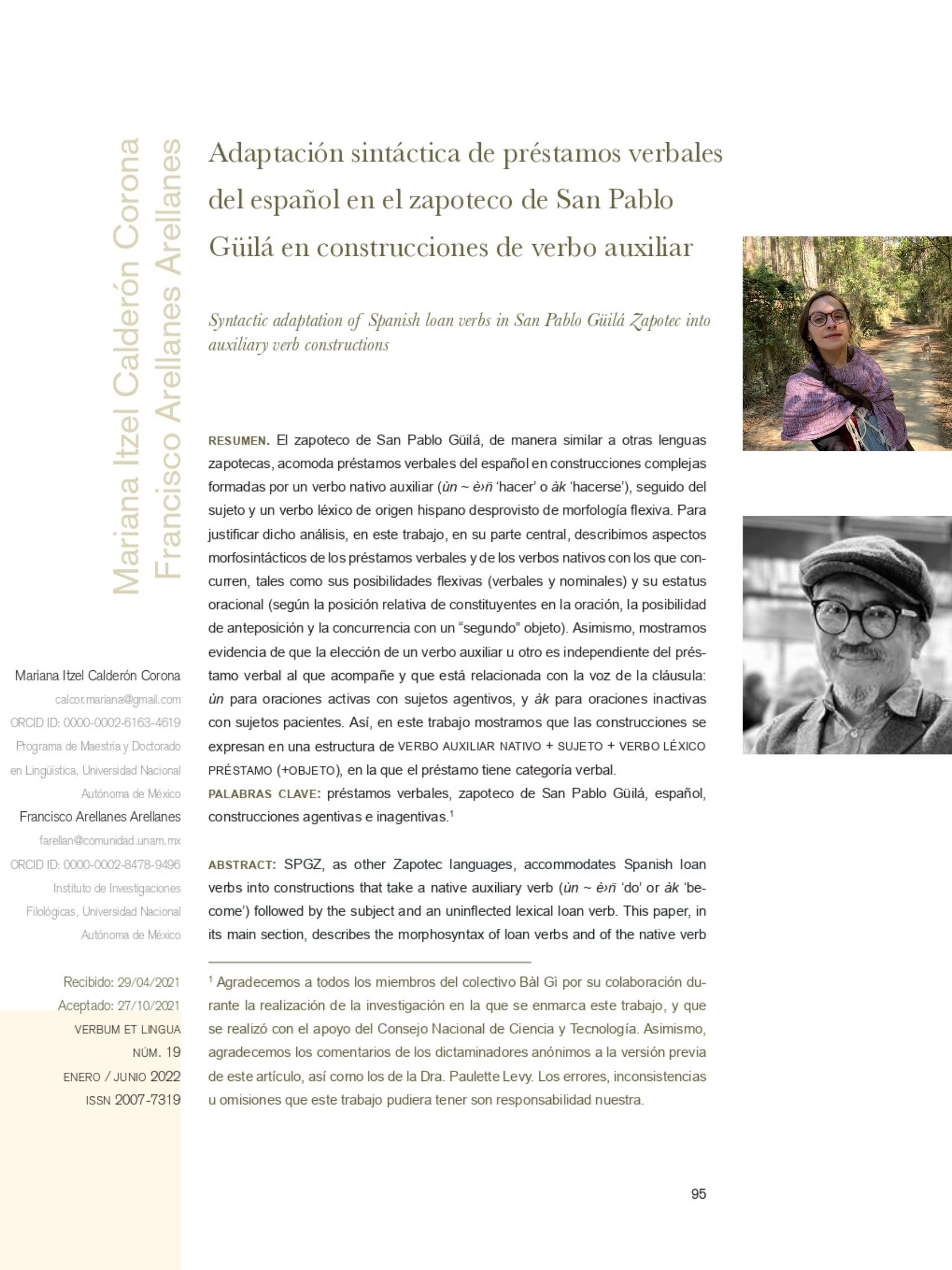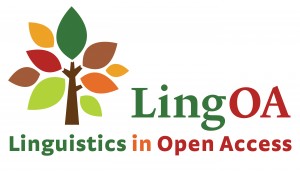Syntactic adaptation of Spanish loan verbs in San Pablo Güilá Zapotec into auxiliary verb constructions.
DOI:
https://doi.org/10.32870/vel.vi19.174Keywords:
Loan verbs, San Pablo Güilá Zapotec, Spanish, Agentive and unagentive constructionsAbstract
SPGZ, as other Zapotec languages, accommodates Spanish loan verbs into constructions that take a native auxiliary verb (ùn ~ è›n? ‘do’ or àk ‘become’) followed by the subject and an uninflected lexical loan verb. This paper, in its main section, describes the morphosyntax of loan verbs and of the native verb that appears with them, focusing on inflectional properties (nominal and verbal), constituency tests (constituents order, preposing and nominal modification), and cooccurrence with a “second” object. It also presents evidence revealing that the choice of one of the two auxiliaries is independent of the loan with verb it appears with but is related to the clause's voice: ùn for active clauses expressing agentive subjects and àk for unactive clauses expressing patientive subjects. In this way, this paper shows that loan verb constructions of SPGZ are expressed in a construction build by a NATIVE AUXILIARY VERB + SUBJECT + LEXICAL LOAN VERB (+ OBJECT), in which the loan is a verb.
Downloads
References
Arellanes, Francisco. 2013. Cómo convertir el aspecto en tiempo: traducción del zapoteco al español. Estudios de Traducción, 3: 237–56.
Arellanes, Francisco. 2016. The formation of names in San Pablo Güilá Zapotec based on Hispanic names: data supporting Correspondence Theory. Signos Lingüísticos,12(24):36.
Arellanes, Francisco. 2017. Aspectos de la frase nominal en el zapoteco de San Pablo Güilá. Austin: Universidad de Texas.
Arrieta, Ana Laura. 2019. La expresión de la cardinalidad definida en español y en el zapoteco de San Pablo Güilá. Tesis de maestría. Ciudad de México: Universidad Nacional Autónoma de México.
Beam de Azcona, Rosemary. 2017. “Spanish infinitives borrowed into Zapotec light verb constructions”, en Language Contact in Mesoamerica and beyond, editado por K. Dakin, C. Parodi, y N. Operstein, (pp. 55–80). Amsterdam/ Philadelphia: John Benjamins Publishing Company.
Black, Cheryl. 1994. Quiegolani Zapotec Syntax. Tesis de Doctorado. Santa Cruz: University of California.
Bueno Holle, Juan José. 2019. Information Structure in Isthmus Zapotec Narrative and Conversation. Zenodo.
Calderón, Mariana. 2021. Adaptación sintáctica de préstamos verbales del español en el zapoteco de San Pablo Güilá. Tesis de maestría. Ciudad de México: Universidad Nacional Autónoma de México.
Chávez-Peón, Mario, y Calisto Mudzingwa. 2007. The Syntax of Modal Auxiliaries in Tlacolula Valley Zapotec. Austin: Universidad de Texas.
Chomsky, Noam. 1957. Syntactic structures. The Hague: Mouton.
Chomsky, Noam. 1991. “Some notes on economy of derivation and representation”, en R. Freidin (ed.), Principles and parameters in comparative grammar, (pp. 41-58). Cambridge: MIT Press.
Folli, Raffaella, y Heidi Harley. 2007. Causation, Obligation, and Argument Structure: On the Nature of Little v. Linguistic Inquiry, 38(2):197–238.
García-Miguel, José. 2001. Tipología de las variaciones de diátesis en lenguas amerindias. Contacto interlingüístico e intercultural en el mundo hispano I: 209–38.
Grimshaw, Jane. (1997). Projection, heads, and optimality. Linguistic Inquiry, 28:
–422.
Gutiérrez Lorenzo, Ambrocio. 2014. Construcciones de verbos seriales en el zapoteco de Teotitlán del Valle. Tesis de Maestría, Ciudad de México: CIESAS D.F.
Harley, Heidi. 2017. “The ‘bundling’ hypothesis and the disparate functions of little v”, en The Verbal Domain, editado por R. D’Alessandro, I. Franco, y Á. J. Gallego, (Pp. 3–28). Oxford: Oxford University Press.
Instituto Nacional de Estadística y Geografía. 2020. Censo de Población y Vivienda 2020. México.
Instituto Nacional de Lenguas Indígenas. 2008. Catálogo de las Lenguas Indígenas Nacionales: variantes lingüísticas de México con sus autodenominaciones y referencias geoestadísticas. México: Diario Oficial de la Federación.
Kang, Yoonjung. 2003. Perceptual similarity in loanword adaptation: English postvocalic word-fi nal stops in Korean. Phonology 20(2): 219–73.
Kenstowicz, Michael. 2005. The phonetics and phonology of Korean loanword adaptation. Leiden: Leiden University.
López Corona, Georgete. 2016. La codificación del objeto en el zapoteco de San Pablo Güilá Una muestra de marcación diferenciada. Lingüística Mexicana, VIII(1): 41–74.
López Cruz, Ausencia. 1997. Morfología verbal del zapoteco de San Pablo Güilá. Tesis de Licenciatura. Ciudad de México: ENAH.
Moravcsik, Edith. 1975. Borrowed verbs. Wiener Linguistische Gazette, 8: 3–30.
Padilla, Roberto, Ausencia López Cruz, y Alejandro Luis Gómez. 2011. “Grafías del zapoteco Valles Centrales de Oaxaca”. Manuscrito.
Prieto, Pilar. 1992. Truncation processes in Spanish. Studies in the Linguistic Sciences, 22(1):143–58.
Quintana, Mariana. 2018. Tâb xt?n Jwâny Plôg. Tesis de Licenciatura. Ciudad de México: Universidad Autónoma Metropolitana-Iztapalapa.
Radford, Andrew. 2016. Analysing English sentences. Second Edition. Cambridge: Cambridge University Press.
Sicoli, Mark. 1999. A comparision of spanish loanwords in two zapotecan languages: contact-induced language change in Lachixío and Juchitán. Tesis de Maestría. Santa Cruz: University of California.
Smith, Jennifer. 2005. “Loan phonology is not all perception: evidence from Japanese loan doublets”, en Japanese/Korean Linguistics. Vol. 14, editado por T. J. Vance y K. A. Jones, (pp. 63–74). Standford: Center for the Study of Language and Information Publications.
Suárez Galván, Carlos. 2020. “B?w El Coyote”. Manuscrito.
Uchihara, Hiroto, y Francisco Arellanes. 2015. “Clases tonales en zapoteco central”. Conferencia presentada en el VII Congreso de Idiomas Indígenas Latinoamérica. Austin: Universidad de Texas.
Vázquez Martínez, Norma Leticia. 2019. “El foco de oración en el zapoteco de San Pedro Mixtepec”, en IX Congreso de Idiomas Indígenas de Latinoamérica.
Austin: Universidad de Texas.
Wichmann, Søren, y Jan Wohlgemuth. 2005. “Loan verbs in a typological perspective”, en Proceedings of the “Romanisation Worldwide” conference, editado por T. S. Stolz, R. Palomo, y D. Bakker.
Wohlgemuth, Jan. 2009. A Typology of Verbal Borrowings. Berlin: Mouton de Gruyter.

Downloads
Published
Versions
- 2024-09-06 (2)
- 2022-06-21 (1)












